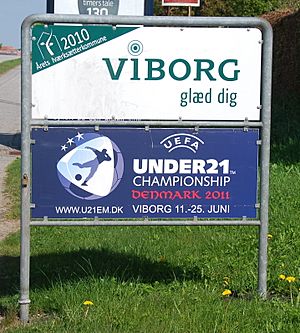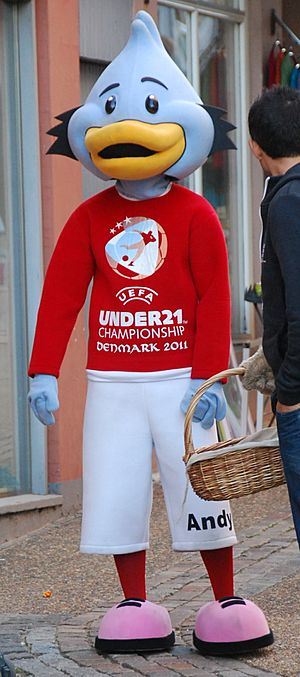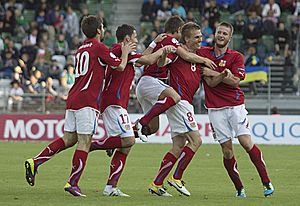2011 UEFA European Under-21 Championship facts for kids
| UEFA U21-EM 2011 ' | |
|---|---|
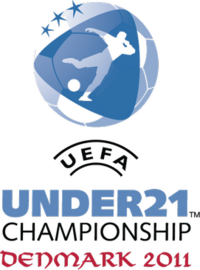 |
|
| Tournament details | |
| Host country | |
| Dates | 11–25 June |
| Teams | 8 (from 1 confederation) |
| Venue(s) | 4 (in 4 host cities) |
| Final positions | |
| Champions | |
| Runners-up | |
| Third place | |
| Fourth place | |
| Tournament statistics | |
| Matches played | 16 |
| Goals scored | 36 (2.25 per match) |
| Attendance | 101,955 (6,372 per match) |
| Top scorer(s) | |
| Best player | |
The UEFA European Under-21 Championship 2011 was a big football tournament for young players in Europe. It was the 18th time this event was held by UEFA. The final games took place in Denmark from June 11 to June 25, 2011.
Denmark was chosen to host the tournament by UEFA's Executive Committee on December 10, 2008. They picked Denmark over another country, Israel.
Teams had to play qualification matches between March 2009 and October 2010 to earn a spot in the tournament.
This championship was also important because it helped decide which three European teams would play in the 2012 Summer Olympics in London.
In the end, Spain won their third title. They beat Switzerland 2–0 in the final match.
Contents
- Choosing the Host Country
- How Teams Qualified
- Where the Games Were Played
- How the Tournament Worked
- Team Seeding
- Team Rosters
- Referees for the Games
- How Ties Were Broken
- Group Stage Matches
- Knockout Stage
- Top Goalscorers
- Best Players of the Tournament
- Final Standings and Olympic Qualifiers
- Where to Watch the Games
- See also
Choosing the Host Country
Only two countries wanted to host this big football event at first: Denmark and Israel. Both countries sent in their plans on June 15, 2008.
UEFA looked at both plans carefully from June to September 2008. After reviewing everything, a special committee suggested Denmark. On December 10, 2008, UEFA officially announced that Denmark would be the host.
How Teams Qualified
The draw for the qualifying games happened in Århus on February 4, 2009. This draw put the teams into ten different groups. There were two groups with six teams and eight groups with five teams. Teams were trying to get one of the seven spots in the final tournament, as Denmark was already in as the host.
Teams were placed into different "pots" for the draw based on how well they had played in past tournaments. Each group had one team from the top five pots. Some groups also had a team from the sixth pot. Six European countries that had played in the 2009 FIFA U-20 World Cup (Germany, Italy, Czech Republic, Hungary, Spain, and England) were each put into one of the six groups with five teams.
The 2012 Summer Olympics and Great Britain
This tournament was used to decide which European teams would go to the 2012 Summer Olympics in London. The best teams from this championship would get to play in the Olympics.
The four football associations from Great Britain (England, Scotland, Wales, and Northern Ireland) entered the qualification process separately. However, they couldn't qualify for the Olympics as individual teams. If any British team had qualified for the championship and made it past the first round, they would have played extra games to decide who went to the Olympics.
Since Great Britain was hosting the 2012 Olympics, they automatically got a spot in the football competition. This caused some debate because in the Olympics, Great Britain plays as one team, but in football, they usually play as four separate nations. Scotland, Wales, and Northern Ireland were worried that playing as a single Great Britain team might make them lose their independent status in UEFA and FIFA.
In 2009, they found a solution: England would put together a team for the Olympics, and the other three nations would not play but also wouldn't object to England's involvement.
Teams that played
The following 8 teams earned their spot in the 2011 UEFA European Under-21 Championship:
 Belarus
Belarus Czech Republic
Czech Republic Denmark (Host Nation)
Denmark (Host Nation) England
England Iceland
Iceland Spain
Spain Switzerland
Switzerland Ukraine
Ukraine
Where the Games Were Played
All the tournament games were held in the Jutland region of Denmark. They used existing stadiums in four cities: Aarhus, Aalborg, Herning, and Viborg.
On September 20, 2010, it was announced that the final match would be played at Aarhus Stadion. Aalborg Stadion was chosen for the opening match and any play-off games for the Olympics. The semifinal matches were played at Herning Stadium and Viborg Stadion. The Danish team played all their group matches in Aalborg and Aarhus.
| Aarhus | Aalborg | Herning | Viborg |
|---|---|---|---|
| Aarhus Stadion | Aalborg Stadion | Herning Stadium | Viborg Stadion |
| 56°7′55″N 10°11′47″E / 56.13194°N 10.19639°E | 57°3′5.4″N 9°53′56.76″E / 57.051500°N 9.8991000°E | 56°7′1″N 8°57′6″E / 56.11694°N 8.95167°E | 56°27′21.23″N 9°24′7.43″E / 56.4558972°N 9.4020639°E |
| Capacity: 20,000 | Capacity: 10,500 | Capacity: 9,600 | Capacity: 9,566 |
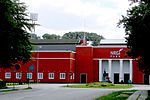 |
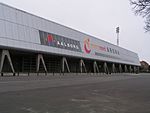 |
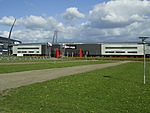 |
 |
How the Tournament Worked
The tournament started with eight teams divided into two groups of four. The top two teams from each group then moved on to the semifinals. From there, it became a knockout competition, meaning if a team lost, they were out.
This championship also helped teams qualify for the Olympic Football Tournament, especially since it was held one year before the Summer Olympic Games.
Players could play in the 2011 UEFA European Under-21 Championship if they were born on or after January 1, 1988.
Team Seeding
The draw to decide which teams played in which groups happened on November 9, 2010. It took place at the Aalborg Congress & Culture Centre in Aalborg.
Just like in earlier tournaments, all the games for each group were held at only two stadiums. For the draw, the teams were put into three "seeding" pots. This was based on how many points they earned per game during the qualification stage. Each group had one team from Pot 1, one from Pot 2, and two teams from Pot 3. Denmark, as the host country, was automatically placed first in a group.
| Pot 1 | Pot 2 | Pot 3 |
|---|---|---|
|
|
|
Team Rosters
Each team in the 2011 Euro U-21 Championship had 23 players on their roster. This was the same as the previous tournament in 2009. Only players born on or after January 1, 1988, were allowed to play.
Referees for the Games
In April 2011, UEFA announced the list of referees, assistant referees, and fourth officials for the tournament. All the main referees were top-level international referees. They were chosen because they were seen as future elite referees. They were all between 31 and 38 years old, fitting the idea that this tournament is for the "stars of tomorrow."
Referees
- Robert Schörgenhofer (Austria)
- Paolo Tagliavento (Italy)
- Marijo Strahonja (Croatia)
- Aleksandar Stavrev (Macedonia)
- Milorad Mažić (Serbia)
- Markus Strömbergsson (Sweden)
Fourth Officials
- Kenn Hansen (Denmark)
- Liran Liany (Israel)
How Ties Were Broken
If two or more teams had the same number of points after all the group matches, special rules were used to decide their ranking. These rules were similar to those used in the 2009 Under-21 Euro tournament:
- The team with more points from games played only among the tied teams ranked higher.
- If still tied, the team with a better goal difference in those specific games ranked higher.
- If still tied, the team that scored more goals in those specific games ranked higher.
- If teams were still tied after these steps, the first three rules were used again for just those remaining tied teams. If a decision still wasn't made, then the next rules applied.
- Looking at all group matches:
* The team with a better overall goal difference. * The team that scored more goals overall. * The team with better fair play (fewer yellow/red cards).
- If everything else was equal, a drawing of lots (like picking names from a hat) would decide.
Group Stage Matches
The draw for the groups happened on November 9, 2010, in Aalborg, Denmark. In the first round, the eight teams were split into two groups, each with four teams. Every team in a group played against every other team in that group once. Teams got three points for a win, one point for a draw, and no points for a loss. The top two teams from each group then moved on to the semifinals.
Group A
In Group A, three teams (Belarus, Denmark, and Iceland) all ended up with three points. To decide which team advanced, special tie-breaker rules were used. Belarus moved forward because they had a better goal difference in the games played only between those three tied teams.
|
3 Way Tie-Breaker
|
All times are UTC+2.
| 11 June 2011 18:00 |
Belarus |
2–0 | Aarhus Stadion, Aarhus Attendance: 2,815 Referee: Aleksandar Stavrev (Macedonia) |
|
|---|---|---|---|---|
| Varankow Skavysh |
Report |
| 11 June 2011 20:45 |
Denmark |
0–1 | Aalborg Stadion, Aalborg Attendance: 9,678 Referee: Robert Schörgenhofer (Austria) |
|
|---|---|---|---|---|
| Report | Shaqiri |
| 14 June 2011 18:00 |
Switzerland |
2–0 | Aalborg Stadion, Aalborg Attendance: 1,903 Referee: Marijo Strahonja (Croatia) |
|
|---|---|---|---|---|
| Frei Emeghara |
Report |
| 14 June 2011 20:45 |
Denmark |
2–1 | Aarhus Stadion, Aarhus Attendance: 18,152 Referee: Paolo Tagliavento (Italy) |
|
|---|---|---|---|---|
| Eriksen Jørgensen |
Report | Baha |
| 18 June 2011 20:45 |
Iceland |
3–1 | Aalborg Stadion, Aalborg Attendance: 9,308 Referee: Milorad Mažić (Serbia) |
|
|---|---|---|---|---|
| Sigþórsson Bjarnason Valgarðsson |
Report | Kadrii |
| 18 June 2011 20:45 |
Switzerland |
3–0 | Aarhus Stadion, Aarhus Attendance: 1,604 Referee: Markus Strömbergsson (Sweden) |
|
|---|---|---|---|---|
| Mehmedi Feltscher |
Report |
Group B
| Team | Pld | W | D | L | GF | GA | GD | Pts |
|---|---|---|---|---|---|---|---|---|
| 3 | 2 | 1 | 0 | 6 | 1 | +5 | 7 | |
| 3 | 2 | 0 | 1 | 4 | 4 | 0 | 6 | |
| 3 | 0 | 2 | 1 | 2 | 3 | −1 | 2 | |
| 3 | 0 | 1 | 2 | 1 | 5 | −4 | 1 |
All times are UTC+2.
| 12 June 2011 18:00 |
Czech Republic |
2–1 | Viborg Stadion, Viborg Attendance: 4,251 Referee: Milorad Mažić (Serbia) |
|
|---|---|---|---|---|
| Dočkal |
Report | Bilyi |
| 12 June 2011 20:45 |
Spain |
1–1 | Herning Stadium, Herning Attendance: 8,046 Referee: Markus Strömbergsson (Sweden) |
|
|---|---|---|---|---|
| Herrera |
Report | Welbeck |
| 15 June 2011 18:00 |
Czech Republic |
0–2 | Viborg Stadion, Viborg Attendance: 4,662 Referee: Robert Schörgenhofer (Austria) |
|
|---|---|---|---|---|
| Report | Adrián |
| 15 June 2011 20:45 |
Ukraine |
0–0 | Herning Stadium, Herning Attendance: 3,495 Referee: Aleksandar Stavrev (Macedonia) |
|
|---|---|---|---|---|
| Report |
| 19 June 2011 20:45 |
England |
1–2 | Viborg Stadion, Viborg Attendance: 5,262 Referee: Paolo Tagliavento (Italy) |
|
|---|---|---|---|---|
| Welbeck |
Report | Chramosta Pekhart |
| 19 June 2011 20:45 |
Ukraine |
0–3 | Herning Stadium, Herning Attendance: 3,302 Referee: Marijo Strahonja (Croatia) |
|
|---|---|---|---|---|
| Report | Mata Adrián |
Knockout Stage
After the group stage, the tournament moved to a knockout format. This means that if a team lost a match, they were out of the competition.
Knockout Map
| Semifinals | Final | ||||||
| 22 June – Herning | |||||||
| |
1 | ||||||
| |
0 | ||||||
| 25 June – Aarhus | |||||||
| |
0 | ||||||
| |
2
|
||||||
| Olympic play-off | |||||||
| 22 June – Viborg | 25 June – Aalborg | ||||||
| |
3 | |
0 | ||||
| |
1
|
|
1 | ||||
Semifinals
The winners of these semifinal matches earned a spot in the 2012 Summer Olympics.
| 22 June 2011 18:00 |
Spain |
3–1 (a.e.t.) | Viborg Stadion, Viborg Attendance: 7,521 Referee: Markus Strömbergsson (Sweden) |
|
|---|---|---|---|---|
| Adrián Jeffrén |
Report | Varankow |
| 22 June 2011 21:00 |
Switzerland |
1–0 (a.e.t.) |
Herning Stadium, Herning Attendance: 5,038 Referee: Robert Schörgenhofer (Austria) |
|
|---|---|---|---|---|
| Mehmedi |
Report |
Olympic Play-off Match
The winner of this match also qualified for the 2012 Summer Olympics.
| 25 June 2011 15:00 |
Czech Republic |
0–1 | Aalborg Stadion, Aalborg Attendance: 870 Referee: Milorad Mažić (Serbia) |
|
|---|---|---|---|---|
| Report | Filipenko |
The Final Game
| 25 June 2011 20:45 |
Switzerland |
0–2 | Aarhus Stadion, Aarhus Attendance: 16,110 Referee: Paolo Tagliavento (Italy) |
|
|---|---|---|---|---|
| https://www.uefa.com/under21/match/2003419--switzerland-vs-spain/ | Herrera Thiago |
Top Goalscorers
- 5 goals
- 3 goals
- 2 goals
 Andrey Varankow
Andrey Varankow Bořek Dočkal
Bořek Dočkal Ander Herrera
Ander Herrera Juan Mata
Juan Mata Danny Welbeck
Danny Welbeck
- 1 goal
 Dzmitry Baha
Dzmitry Baha Egor Filipenko
Egor Filipenko Maksim Skavysh
Maksim Skavysh Jan Chramosta
Jan Chramosta Tomáš Pekhart
Tomáš Pekhart Christian Eriksen
Christian Eriksen Nicolai Jørgensen
Nicolai Jørgensen Bashkim Kadrii
Bashkim Kadrii Birkir Bjarnason
Birkir Bjarnason Kolbeinn Sigþórsson
Kolbeinn Sigþórsson Valgarðsson
Valgarðsson Thiago
Thiago Jeffrén
Jeffrén Innocent Emeghara
Innocent Emeghara Frank Feltscher
Frank Feltscher Fabian Frei
Fabian Frei Xherdan Shaqiri
Xherdan Shaqiri Maksym Bilyi
Maksym Bilyi
Best Players of the Tournament
UEFA had a special team of experts who watched every game. After the final, they chose the 23 best players from the entire tournament. This group of players was called the "UEFA Team of the Tournament." Spain had the most players on this team, with seven.
- UEFA Team of the Tournament
| Goalkeepers | Defenders | Midfielders | Forwards |
Final Standings and Olympic Qualifiers
- Spain, Switzerland, and Belarus all qualified to play in the football finals at the 2012 Olympic Games.
See Football at the 2012 Summer Olympics
| Pos | Team | Pld | W | D | L | GF | GA | GD | Pts | Final result |
|---|---|---|---|---|---|---|---|---|---|---|
| 5 | 4 | 1 | 0 | 11 | 2 | +9 | 13 | Gold Medal | ||
| 5 | 4 | 0 | 1 | 7 | 2 | +5 | 12 | Silver Medal | ||
| 5 | 2 | 0 | 3 | 5 | 8 | −3 | 6 | Bronze Medal | ||
| 4 | 5 | 2 | 0 | 3 | 4 | 6 | −2 | 6 | Fourth place | |
| 5 | 3 | 1 | 0 | 2 | 3 | 5 | −2 | 3 | Eliminated in group stage |
|
| 6 | 3 | 0 | 2 | 1 | 2 | 3 | −1 | 2 | ||
| 7 | 3 | 1 | 0 | 2 | 3 | 5 | −2 | 3 | ||
| 8 | 3 | 0 | 1 | 2 | 1 | 5 | −4 | 1 |
(H) Host.
Where to Watch the Games
Many TV channels around the world showed the UEFA European Under-21 Championship 2011. Here's a list of some of the broadcasters:
| Country/area | Broadcaster(s) | Source |
|---|---|---|
| Belteleradio | ||
| Telenet | ||
| Globosat | ||
| Astro SuperSport | ||
| Nova Sport (Bulgaria) | ||
| TSN (8 matches) TSN2 (9 matches) |
||
| Telecanal (some matches) | ||
| Česká televize | ||
| TV 2 (5 matches) TV 2 Sport (8 matches) TV 2 Zulu (2 matches) |
||
| Direct8 | ||
| Eurosport | ||
| Trecevision Canal 11 |
||
| RÚV | ||
| RCTI Indovision |
||
| Sport 1 Sport 1 HD |
||
| Sky Sports | ||
| RAI | ||
| TV Asahi | ||
| Latin America (except Brazil) | Televideo Services | |
| Astro SuperSport | ||
| OTI | ||
| Middle East and North Africa | Al Jazeera Sports +4, +10
Al Jazeera Sports HD1 |
|
| Viasat Fotball | ||
| Sport TV | ||
| Supersport International | ||
| Cuatro (Spain's matches) La Siete |
||
| Viasat | ||
| SRG SSR | ||
| MCOT/ GMM SPORT | ||
| ICTV Football TV Channel |
||
| Sky Sports 1/Sky Sports HD1 | ||
| Meridiano |
See also
 In Spanish: Eurocopa Sub-21 de 2011 para niños
In Spanish: Eurocopa Sub-21 de 2011 para niños
 | Audre Lorde |
 | John Berry Meachum |
 | Ferdinand Lee Barnett |


